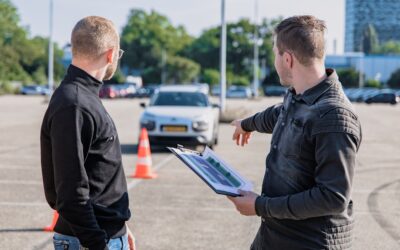Moving to a new province for work, study or personal reasons is a great way to reset your life, but it also comes with some responsibilities. One of those is ensuring that your driver’s license and vehicle registration align with both provincial requirements and laws as well as the requirements of your insurance policy. Driving an out-of-province car in Ontario can easily put you in a situation where you are breaking provincial laws and possibly nullifying parts of your insurance policy. Let’s examine some of the factors you should consider when driving an out-of-province car in Ontario.
What should I know before coming to Ontario with an Out-of-Province Car?
Like every Canadian province and territory, you must have a valid driver’s license to drive in Ontario, your vehicle must be registered with a government authority and carry a licence plate. In addition, the vehicle must have proof of insurance with the coverages required by law in the province where it is registered.
If you are driving your vehicle from the US, your American driver’s license, vehicle registration and insurance should be valid during your visit. We again encourage you to speak to your insurance specialist to understand how your policy may respond differently if you have an accident during your trip.
If you are visiting from another country, your driver’s license should be valid in Canada during your visit. If your license is in a language other than English or French, it is strongly advised that you apply for an International Driving Permit before your trip. This permit confirms your license status and displays your information in English and French in the event you are stopped by police for an infraction or involved in an accident.
How long can you drive in Ontario with license plates from another province as a visitor?
As a visitor, you can drive in Ontario with license plates from another province for the full extent of your trip, with no time limits.
However, if you are moving to live in Ontario, different rules apply. If you plan on taking up residence in Ontario, you must register a vehicle (with province plates) and license your vehicle in the province within 60 days. You will also need to transfer your driver’s license to one issued in Ontario within this time frame.
Requirements to register an out-of-province vehicle in Ontario — what is the process?
To register an out-of-province vehicle in Ontario, you will need to complete a series of steps prior to the registration process.
- First, you will need to transfer your driver’s license to one issued in Ontario.
- Second, you will need to purchase an Ontario auto insurance policy for your vehicle and be able to provide proof of car insurance coverage when asked.
- Third, to register your vehicle in Ontario, you must have proof that you own the vehicle. This can be the registration documents from your previous province or a bill of sale.
- Fourth, any vehicle coming to Ontario from another country or province must obtain a Safety Standard Certificate which confirms that it meets all provincial safety and pollution requirements.
With these documents in hand, you can then visit any ServiceOntario office and complete the registration process. You will be provided with a vehicle registration document as well as an Ontario licence plate. In Ontario, privately owned vehicles no longer need a licence plate sticker based on your date of birth.
If I am visiting Ontario with an Out-of-Province Car, is a license from a different province valid?
In Canada, your provincial driver’s license, registration, and insurance are portable. This means that regardless of where you visit in the country, all three elements should be valid with very few exceptions (mostly related to commercial vehicles and extreme conditions).
Depending on your home province, your auto insurance may react differently when you are travelling elsewhere. It is highly recommended that you contact your insurance provider before you leave to understand these changes.
How does the driver’s license system work in Ontario?
If you are moving to Ontario, you will need to obtain an Ontario driver’s licence by visiting one of the many DriverTest Centres located across the province.
Ontario uses a graduated licensing system and depending on how long you have been licensed in your home province, there may be limitations and requirements for you to become fully licensed in Ontario.
To become a new driver in Ontario, you must first pass an eye test and successfully complete a written exam. At this point, you will receive a G1 license.
With a G1 license, you must have a fully licensed driver beside you in the vehicle supervising your driving abilities. You cannot have any alcohol in your system and you are prohibited from driving on 400 series highways with a posted limit of 80 km/hour. You may not drive between the hours of midnight and 5:00 am. Your G1 license lasts at least one year, and you must pass a road test to graduate to a G2 license.
With a G2 license, you no longer need to be supervised by a fully licensed driver but you are still not allowed to drink any alcohol. If you are 19 or younger, between the hours of midnight and 5:00 am, you can only have one passenger under 19 for the first 6 months. After 6 months you can have 3 passengers under 19 until you turn 20 or earn your full G licence.
After 12 months as a G2 driver, you will need to take a road test to become a fully licensed driver. You can find out more about graduated licensing and its costs here.
If you are coming from another Canadian province and hold a license with at least two years of driving experience, the process to exchange your license is pretty simple. You simply visit the DriverTest centre with your existing license. You will need to take an eye test, but will probably not need to take a road test.
Drivers moving to Ontario from these countries benefit from the Foreign Driver’s License Exchange program:
- Australia
- Austria
- Belgium
- France
- Germany
- Great Britain
- The Isle of Man
- Japan
- South Korea
- New Zealand
- Northern Ireland
- The Republic of Ireland
- Switzerland
- Taiwan
This program simplifies the process of transferring your license to Ontario. You will need to take an eye test at the DriveTest centre, but in most cases, you will not be required to take a road test.
To learn more about the Foreign Driver’s License Exchange program, visit the Ontario Ministry of Transportation page.
Driving an out-of-province vehicle in Ontario is straightforward if you are visiting, but you need to be aware of the registration and licensing requirements should you decide to move here.
Before any trip or move with an out-of-province car, it is always wise to consult an insurance professional before travelling.







